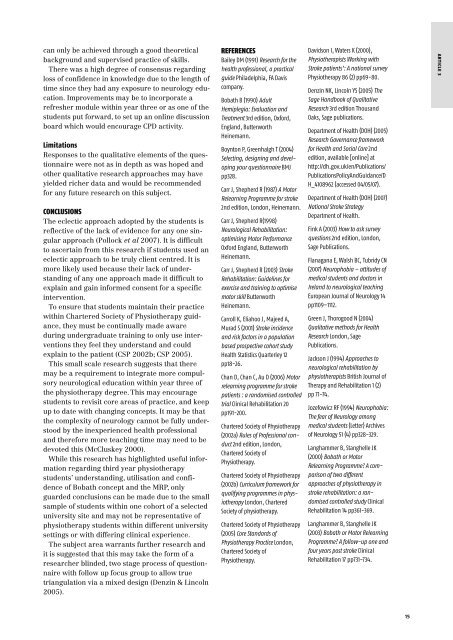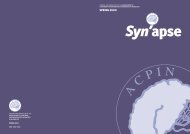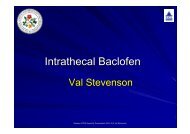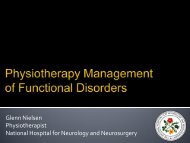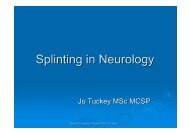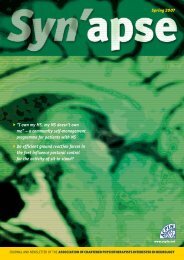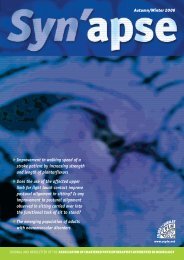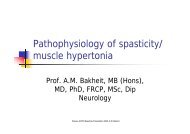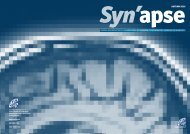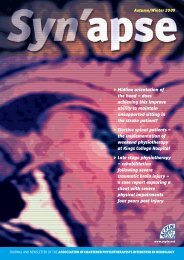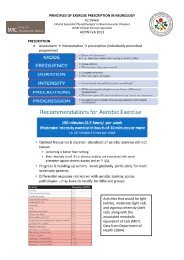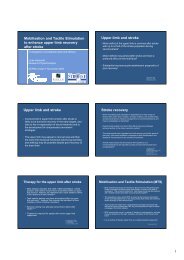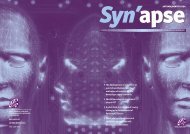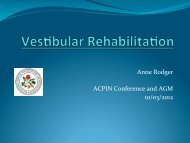SYNAPSE Spring 2009 - acpin
SYNAPSE Spring 2009 - acpin
SYNAPSE Spring 2009 - acpin
Create successful ePaper yourself
Turn your PDF publications into a flip-book with our unique Google optimized e-Paper software.
can only be achieved through a good theoretical<br />
background and supervised practice of skills.<br />
There was a high degree of consensus regarding<br />
loss of confidence in knowledge due to the length of<br />
time since they had any exposure to neurology education.<br />
Improvements may be to incorporate a<br />
refresher module within year three or as one of the<br />
students put forward, to set up an online discussion<br />
board which would encourage CPD activity.<br />
Limitations<br />
Responses to the qualitative elements of the questionnaire<br />
were not as in depth as was hoped and<br />
other qualitative research approaches may have<br />
yielded richer data and would be recommended<br />
for any future research on this subject.<br />
CONCLUSIONS<br />
The eclectic approach adopted by the students is<br />
reflective of the lack of evidence for any one singular<br />
approach (Pollock et al 2007). It is difficult<br />
to ascertain from this research if students used an<br />
eclectic approach to be truly client centred. It is<br />
more likely used because their lack of understanding<br />
of any one approach made it difficult to<br />
explain and gain informed consent for a specific<br />
intervention.<br />
To ensure that students maintain their practice<br />
within Chartered Society of Physiotherapy guidance,<br />
they must be continually made aware<br />
during undergraduate training to only use interventions<br />
they feel they understand and could<br />
explain to the patient (CSP 2002b; CSP 2005).<br />
This small scale research suggests that there<br />
may be a requirement to integrate more compulsory<br />
neurological education within year three of<br />
the physiotherapy degree. This may encourage<br />
students to revisit core areas of practice, and keep<br />
up to date with changing concepts. It may be that<br />
the complexity of neurology cannot be fully understood<br />
by the inexperienced health professional<br />
and therefore more teaching time may need to be<br />
devoted this (McCluskey 2000).<br />
While this research has highlighted useful information<br />
regarding third year physiotherapy<br />
students’ understanding, utilisation and confidence<br />
of Bobath concept and the MRP, only<br />
guarded conclusions can be made due to the small<br />
sample of students within one cohort of a selected<br />
university site and may not be representative of<br />
physiotherapy students within different university<br />
settings or with differing clinical experience.<br />
The subject area warrants further research and<br />
it is suggested that this may take the form of a<br />
researcher blinded, two stage process of questionnaire<br />
with follow up focus group to allow true<br />
triangulation via a mixed design (Denzin & Lincoln<br />
2005).<br />
REFERENCES<br />
Bailey DM (1991) Research for the<br />
health professional, a practical<br />
guide Philadelphia, FA Davis<br />
company.<br />
Bobath B (1990) Adult<br />
Hemiplegia: Evaluation and<br />
Treatment 3rd edition, Oxford,<br />
England, Butterworth<br />
Heinemann.<br />
Boynton P, Greenhalgh T (2004)<br />
Selecting, designing and developing<br />
your questionnaire BMJ<br />
pp328.<br />
Carr J, Shepherd R (1987) A Motor<br />
Relearning Programme for stroke<br />
2nd edition, London, Heinemann.<br />
Carr J, Shepherd R(1998)<br />
Neurological Rehabilitation:<br />
optimising Motor Performance<br />
Oxford England, Butterworth<br />
Heinemann.<br />
Carr J, Shepherd R (2003) Stroke<br />
Rehabilitation: Guidelines for<br />
exercise and training to optimise<br />
motor skill Butterworth<br />
Heinemann.<br />
Carroll K, Eliahoo J, Majeed A,<br />
Murad S (2001) Stroke incidence<br />
and risk factors in a population<br />
based prospective cohort study<br />
Health Statistics Quarterley 12<br />
pp18-26.<br />
Chan D, Chan C, Au D (2006) Motor<br />
relearning programme for stroke<br />
patients : a randomised controlled<br />
trial Clinical Rehabilitation 20<br />
pp191-200.<br />
Chartered Society of Physiotherapy<br />
(2002a) Rules of Professional conduct<br />
2nd edition, London,<br />
Chartered Society of<br />
Physiotherapy.<br />
Chartered Society of Physiotherapy<br />
(2002b) Curriculum framework for<br />
qualifying programmes in physiotherapy<br />
London, Chartered<br />
Society of physiotherapy.<br />
Chartered Society of Physiotherapy<br />
(2005) Core Standards of<br />
Physiotherapy Practice London,<br />
Chartered Society of<br />
Physiotherapy.<br />
Davidson I, Waters K (2000),<br />
Physiotherapists Working with<br />
Stroke patients’: A national survey<br />
Physiotherapy 86 (2) pp69-80.<br />
Denzin NK, Lincoln YS (2005) The<br />
Sage Handbook of Qualitative<br />
Research 3rd edition Thousand<br />
Oaks, Sage publications.<br />
Department of Health (DOH) (2005)<br />
Research Governance framework<br />
for Health and Social Care 2nd<br />
edition, available [online] at<br />
http://dh.gov.uk/en/Publications/<br />
PublicationsPolicyAndGuidance/D<br />
H_4108962 (accessed 04/05/07).<br />
Department of Health (DOH) (2007)<br />
National Stroke Strategy<br />
Department of Health.<br />
Fink A (2003) How to ask survey<br />
questions 2nd edition, London,<br />
Sage Publications.<br />
Flanagana E, Walsh BC, Tubridy CN<br />
(2007) Neurophobia – attitudes of<br />
medical students and doctors in<br />
Ireland to neurological teaching<br />
European Journal of Neurology 14<br />
pp1109–1112.<br />
Green J, Thorogood N (2004)<br />
Qualitative methods for Health<br />
Research London, Sage<br />
Publications.<br />
Jackson J (1994) Approaches to<br />
neurological rehabilitation by<br />
physiotherapists British Journal of<br />
Therapy and Rehabilitation 1 (2)<br />
pp 71-74.<br />
Jozefowicz RF (1994) Neurophobia:<br />
The fear of Neurology among<br />
medical students (Letter) Archives<br />
of Neurology 51 (4) pp328-329.<br />
Langhammer B, Stanghelle JK<br />
(2000) Bobath or Motor<br />
Relearning Programme? A comparison<br />
of two different<br />
approaches of physiotherapy in<br />
stroke rehabilitation: a randomised<br />
controlled study Clinical<br />
Rehabilitation 14 pp361-369.<br />
Langhammer B, Stanghelle JK<br />
(2003) Bobath or Motor Relearning<br />
Programme? A follow-up one and<br />
four years post stroke Clinical<br />
Rehabilitation 17 pp731-734.<br />
ARTICLE 3<br />
15


